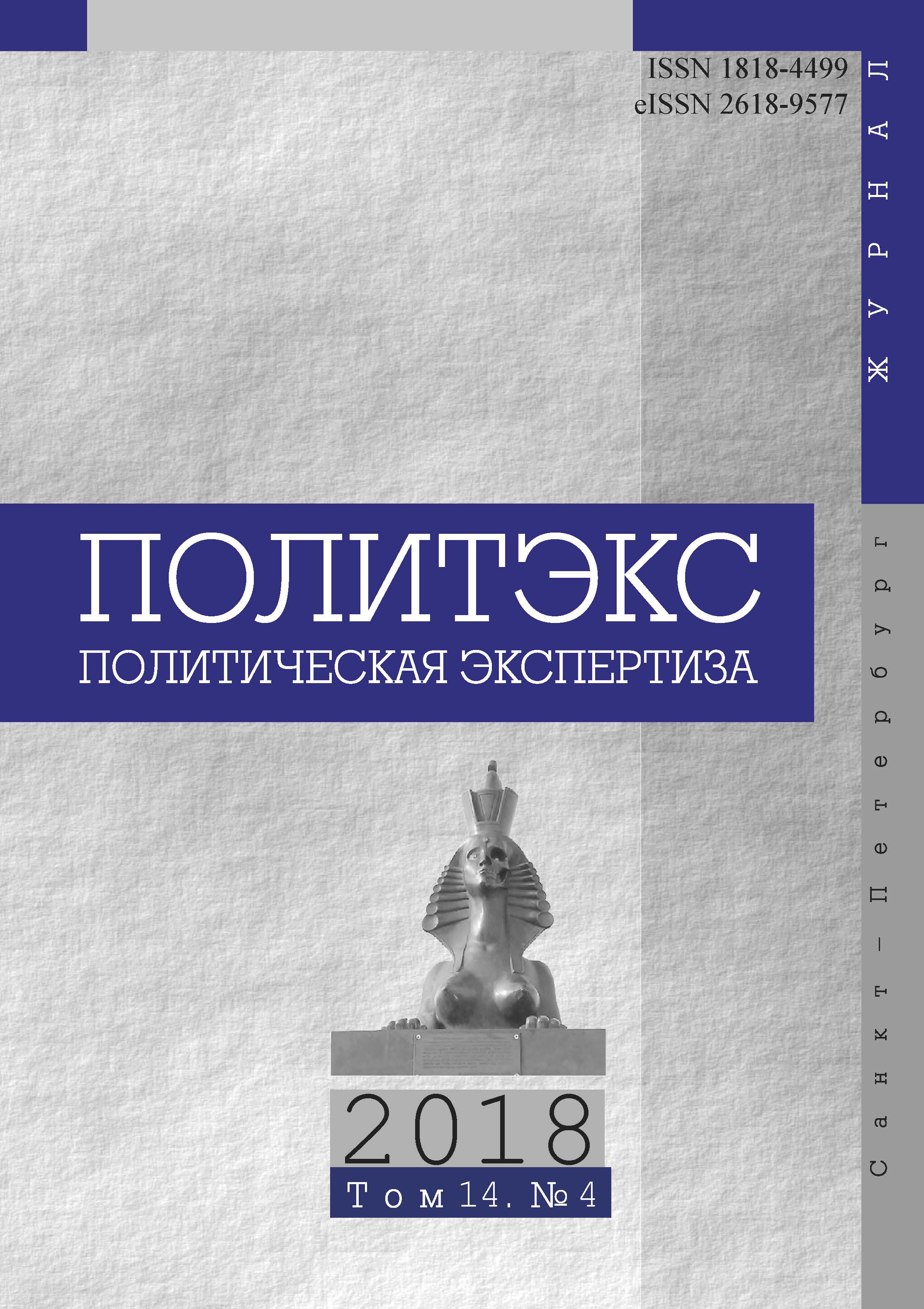IDEOLOGICAL IDENTITY OF THE ALTAI KRAI AND NOVOSIBIRSK YOUTH: BETWEEN MODERNISM AND POSTMODERNISM
DOI:
https://doi.org/10.21638/spbu23.2018.405Abstract
The article deals with an essential problem of ideological identity of the modern Russia youth and the assessment of the correlation of modernist and postmodernist constructs in their worldview. The youth determines the tendencies of any society’s development. This is especially clear in the present times, called “post-postmodern” by many authors, when the youth creates a kind of parallel-existing space in the format of innovation space and predestinates the future instead of forcing their point of view. Thus, the degree of dynamism of Russia and the future directions of its policy depends on the values and attitudes of Russian youth who grew up in the postmodern era, in the context of post-Soviet transformations. The results of an empirical study conducted in the Altai Territory and Novosibirsk are presented. The binary principle of selection of territories for analysis was based on the principle of maximum differences. As the survey has shown, the majority of young people define their ideology as mixed or cannot identify their views. The values of reformism and the interests of the individual are most common among young people and girls from both regions. The authors conclude that there are differences in the value picture of the world between the youth of the Altai Territory and Novosibirsk (in the Altai Territory, the request for justice is included in all types of ideological identification, in Novosibirsk this concerns the striving for personal success), which are dictated by the social and economic situation of the regions, and not a feature of the information age. Special attention is given to the factors influencing the formation of ideological attitudes, in particular, the level of education. Its role in structuring the ideological identity of youth has been proven.
Keywords:
political consciousness, youth, political identity, values, West Siberian regions
Downloads
References
Белл Д. Грядущее постиндустриальное общество. М.: Академия, 1999. 944 с.
Большинство россиян возложили ответственность за проблемы страны на Путина // Левада-центр. 2018. 22 нояб. URL: https://www.levada.ru/2018/11/22/bolshinstvo-rossiyan-vozlozhili-otvetstvennost-za-problemy-strany-na-putina/ (дата обращения: 30.11.2018).
Инглхарт Р., Вельцель К. Модернизация, культурные изменения и демократия: Последо- вательность человеческого развития. М.: Новое издательство, 2011. 464 с.
Коротаев А.В. Арабская весна // Полит.ру. 2013. 10 нояб. URL: http://polit.ru/article/2013/11/10/arabskaya_vesna/ (дата обращения: 30.11.2018).
Протестные настроения россиян: мониторинг // Всероссийский центр изучения обще- ственного мнения. 2018. 5 сент. URL: https://wciom.ru/index.php?id=236&uid=9292 (дата об- ращения: 30.11.2018).
Протесты 2017–2018: рост протестной активности населения // Центр экономических и по- литических реформ. 2018. 8 нояб. URL: http://cepr.su/2018/11/08/protests-2017-2018/ (дата обращения: 30.11.2018).
Сводная таблица результатов выборов // Центральная избирательная комиссия Россий- ской Федерации. 2018. URL: http://www.vybory.izbirkom.ru/region/region/izbirkom?action=show &root=1&tvd=100100084849066&vrn=100100084849062®ion=0&global=1&sub_region=0&prv er=0&pronetvd=null&vibid=100100084849066&type=227 (дата обращения: 30.11.2018).
Тоффлер Э. Третья волна // США — экономика, политика, идеология. 1982. No 2. С. 7–11.
Флорида Р. Креативный класс: люди, которые меняют будущее / пер. с англ. М.: Классика- XXI, 2007. 421 с.
Число желающих протестовать против пенсионной реформы резко снизилось // Левада- центр. 2018. 27 сент. URL: https://www.levada.ru/2018/09/27/chislo-zhelayushhih-protestovat- protiv-pensionnoj-reformy-rezko-snizilos/ (дата обращения: 30.11.2018).
Щенина О.Г. Формы участия молодежи в политическом процессе современной России: дис. ... канд. полит. наук. М.: Ин-т сравнительной политологии РАН, 2005. 165 с.
References
Bell D. Griadushchee postindustrial’noe obshchestvo [The coming of post-industrial society: A venture of social forecasting]. Мoscow, Аkademiia Publ., 1999. 944 p. (In Russian)
Bol’shinstvo rossiian vozlozhili otvetstvennost’ za problemy strany na Putina [The majority of Russians placed responsibility for the problems of the country on Putin]. Levada-center. 2018. No- vember 22. Available at: https://www.levada.ru/2018/11/22/bolshinstvo-rossiyan-vozlozhili-otvet- stvennost-za-problemy-strany-na-putina/ (accessed: 30.11.2018). (In Russian)
Chislo zhelaiushchikh protestovat’ protiv pensionnoi reformy rezko snizilos’ [The number of people willing to protest against the pension reform has decreased dramatically]. Levada-tsentr, 2018. September 27. Available at: https://www.levada.ru/2018/09/27/chislo-zhelayushhih-protes- tovat-protiv-pensionnoj-reformy-rezko-snizilos/ (accessed: 30.11.2018). (In Russian)
Florida R. Kreativnyi klass: liudi, kotorye meniaiut budushchee [The Rise of the Creative Class]. Transl. from English. Мoscow, Klassica-XXI Publ., 2007. 421 p. (In Russian)
Inglehart R., Welzel Ch. Modernizatsiya, kul’turnyye izmeneniya i demokratiya: Posledovatel’nost’ chelovecheskogo razvitiya [Modernization, Cultural Change, and Democracy. The Human Develop- ment Sequence]. Мoscow, Novoe izdatel’stvo Publ., 2011. 464 p.
Korotaev A. V. Аrabskaia vesna [Arab Spring]. Polit.ru. 2013. November 10. Available at: http:// polit.ru/article/2013/11/10/arabskaya_vesna/ (accessed: 30.11.2018). (In Russian)
Protestnye nastroeniia rossiian: monitoring [Protest sentiments among Russians: monitoring]. Vserossiiskii tsentr izucheniia obshchestvennogo mneniia [Russia Public Opinion Research Cent- er], 2018. September 5. Available at: https://wciom.ru/index.php?id=236&uid=9292 (accessed: 30.11.2018). (In Russian)
Protesty 2017–2018: rost protestnoi aktivnosti naseleniia [The protests of 2017–2018: grow- ing political unrest in the country]. Tsentr ekonomicheskikh i politicheskikh reform [Center for Economic and Political Reform], 2018. November 8. Available at: http://cepr.su/2018/11/08/pro- tests-2017-2018/ (accessed: 30.11.2018). (In Russian)
Schenina O.G. Formy uchastiia molodezhi v politicheskom protsesse sovremennoi Rossii: dis. ... kand. polit. nauk [Forms of youth participation in contemporary Russian political life. Political Science PhD thesis]. Moscow, Institut sravnitel’noi politologii RAN Publ., 2005. 165 p. (In Russian)
Svodnaia tablitsa rezul’tatov vyborov [The Summary table of the election results]. Tsentral’naia izbiratel’naia komissiia Rossiiskoi Federatsii [Central Election Commission of the Russian Federa- tion], 2018. Available at: http://www.vybory.izbirkom.ru/region/region/izbirkom?action=show&root =1&tvd=100100084849066&vrn=100100084849062®ion=0&global=1&sub_region=0&prver=0& pronetvd=null&vibid=100100084849066&type=227 (accessed: 30.11.2018). (In Russian)
Toffler A. Tret’ia volna [The Third Wave]. SShA — ekonomika, politika, ideologiia [USA: econom- ics, politics, ideology], 1982, no. 2, pp. 7–11. (In Russian)
Downloads
Published
How to Cite
Issue
Section
License
Articles of "Political Expertise: POLITEX" are open access distributed under the terms of the License Agreement with Saint Petersburg State University, which permits to the authors unrestricted distribution and self-archiving free of charge.




